
Scientific Studies
Ideal Protein is a doctor-designed, Ketogenic Weight Loss Protocol that treats weight loss as healthcare and uses food as medicine to empower you to lose weight and live your best, healthiest life for the rest of your life. Expert guidance from your very own personal coach keeps you motivated. While the huge variety of delicious Ideal Protein food and tons of other fresh, lean, healthy meals and snacks you get to choose from keep you satisfied on your journey to your new healthy weight and beyond. Take your health back today at a clinic near you.
Proven Weight Loss and Improved Metabolic Health
View our collection of clinical trials, case studies and peer-reviewed research.
“Effect of Ideal Protein versus low-fat diet for weight loss: A randomized controlled trial”
Camilo A. Fernandez, MD, Kaitlin Potts, Lydia A. Bazzano, MD, PhD
A new, peer-reviewed study published in Obesity Science & Practice, led by Tulane University, compared the Ideal Protein dietary behavioral intervention (IP system) to a standard, guideline-based, low-calorie, low-fat (LCLF) dietary behavioral intervention.¹·²
The 3-month trial assigned 192 adult participants with body mass index (BMI) ≥30 and ≤49 kg/m2, to either the Ideal Protein Phase 1 diet or LCLF diet interventions.¹
Reported Primary Endpoint (body weight):
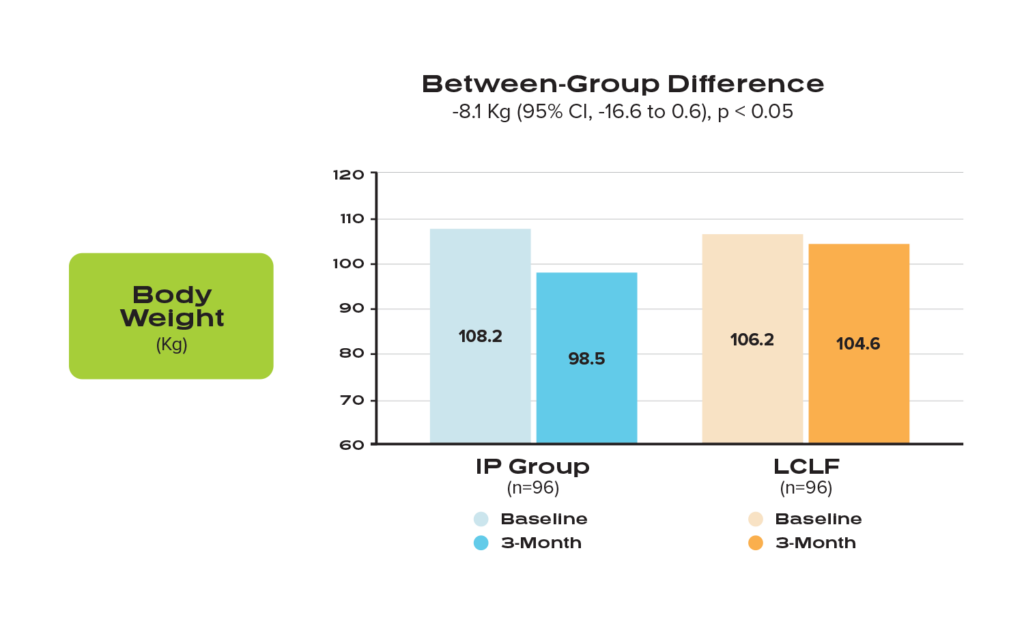
“The IP system resulted in statistically significant greater weight loss among men and women with obesity and additional risk factors for cardiovascular disease (CVD).” ¹
(Comparison of mean weight loss in kg between participants in the IP group vs the LCLF group, at 3 months). Clustered column graph depicting average weight at baseline and 3-month follow-up for each dietary intervention group, respectively.
Reported Secondary Endpoints:
Although both groups saw improvements in several cardiometabolic risk factors, there were significant between-group differences favoring the IP Group, which “experienced greater improvements in waist and hip circumference, total cholesterol, and triglycerides.”¹
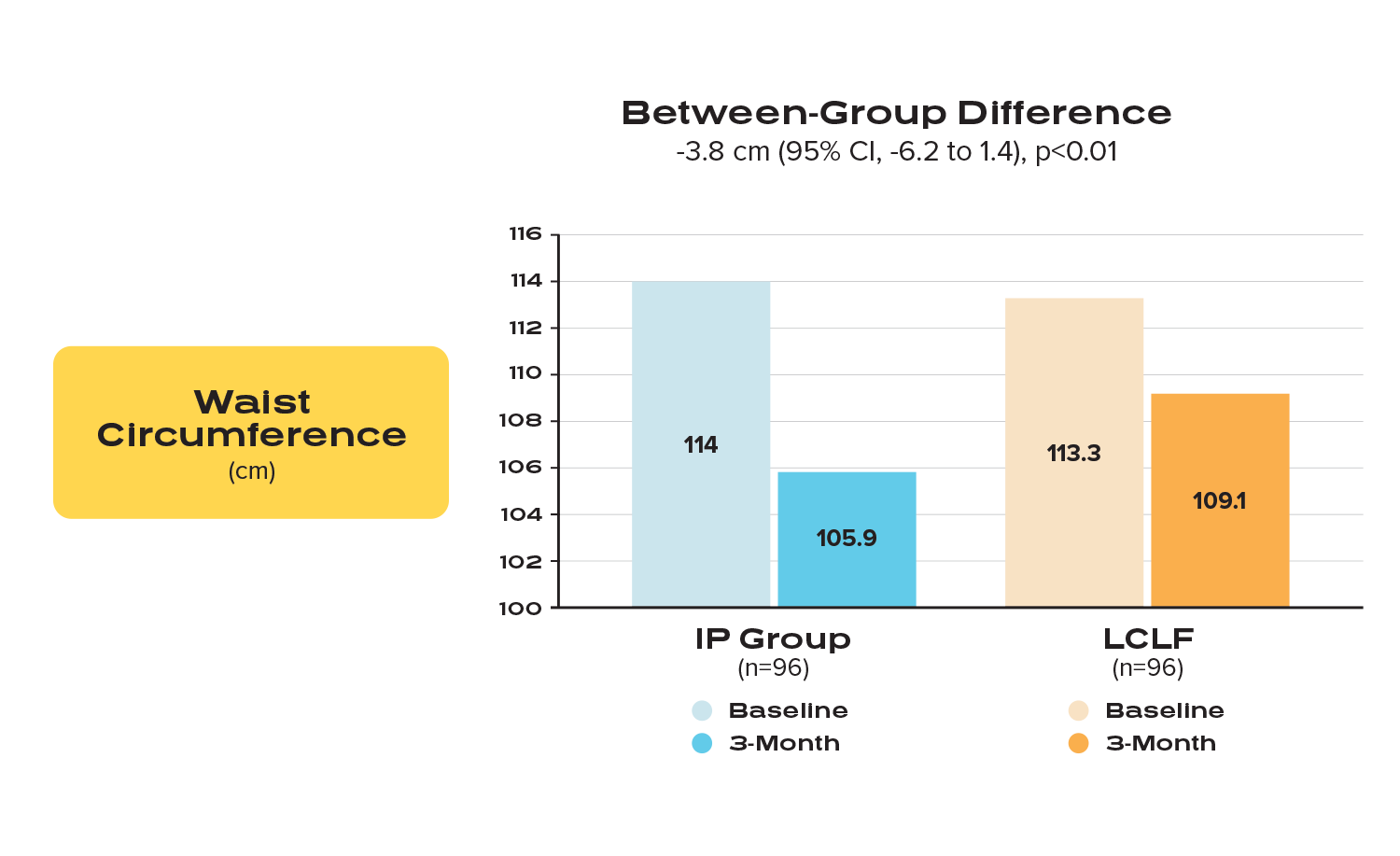
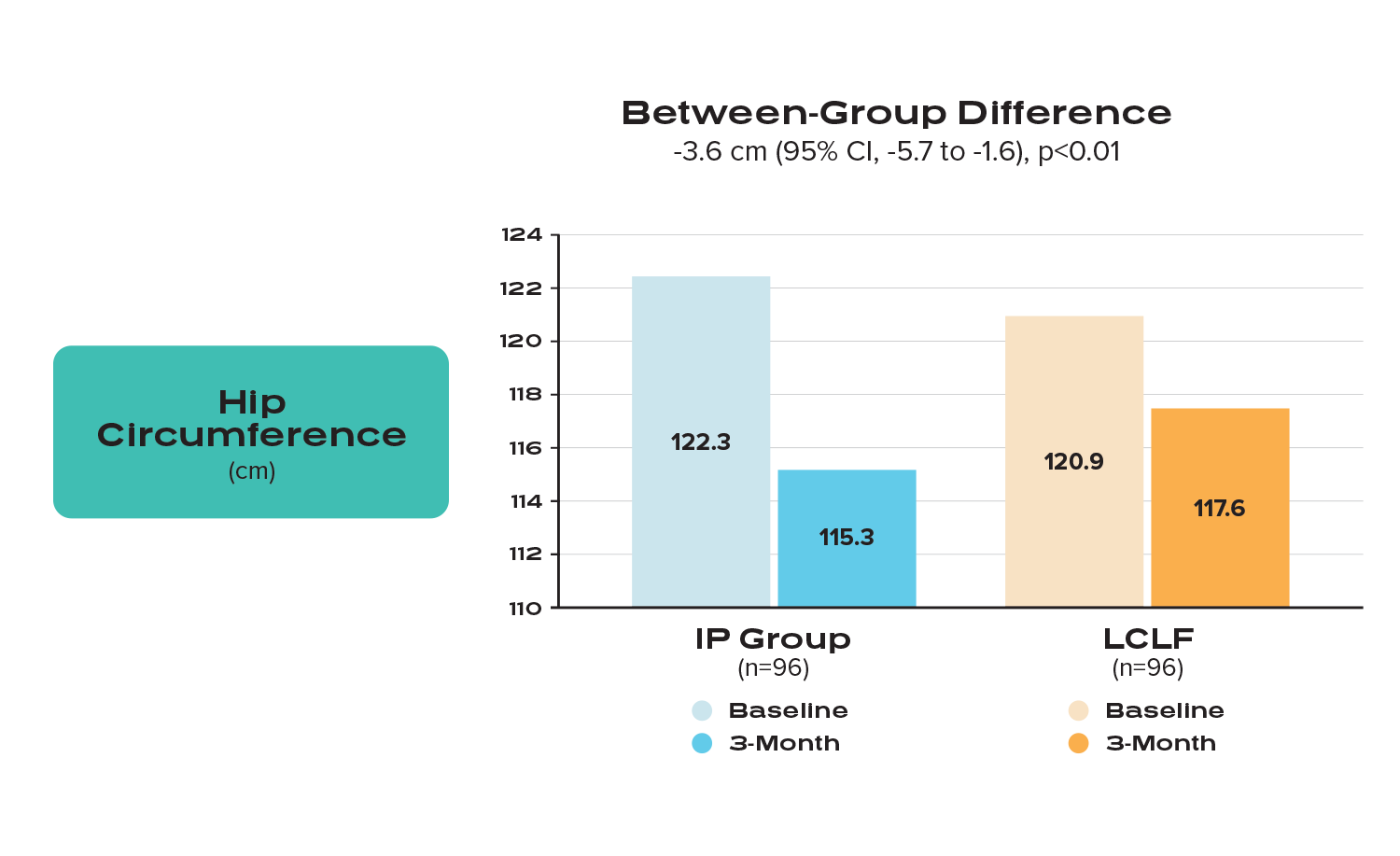
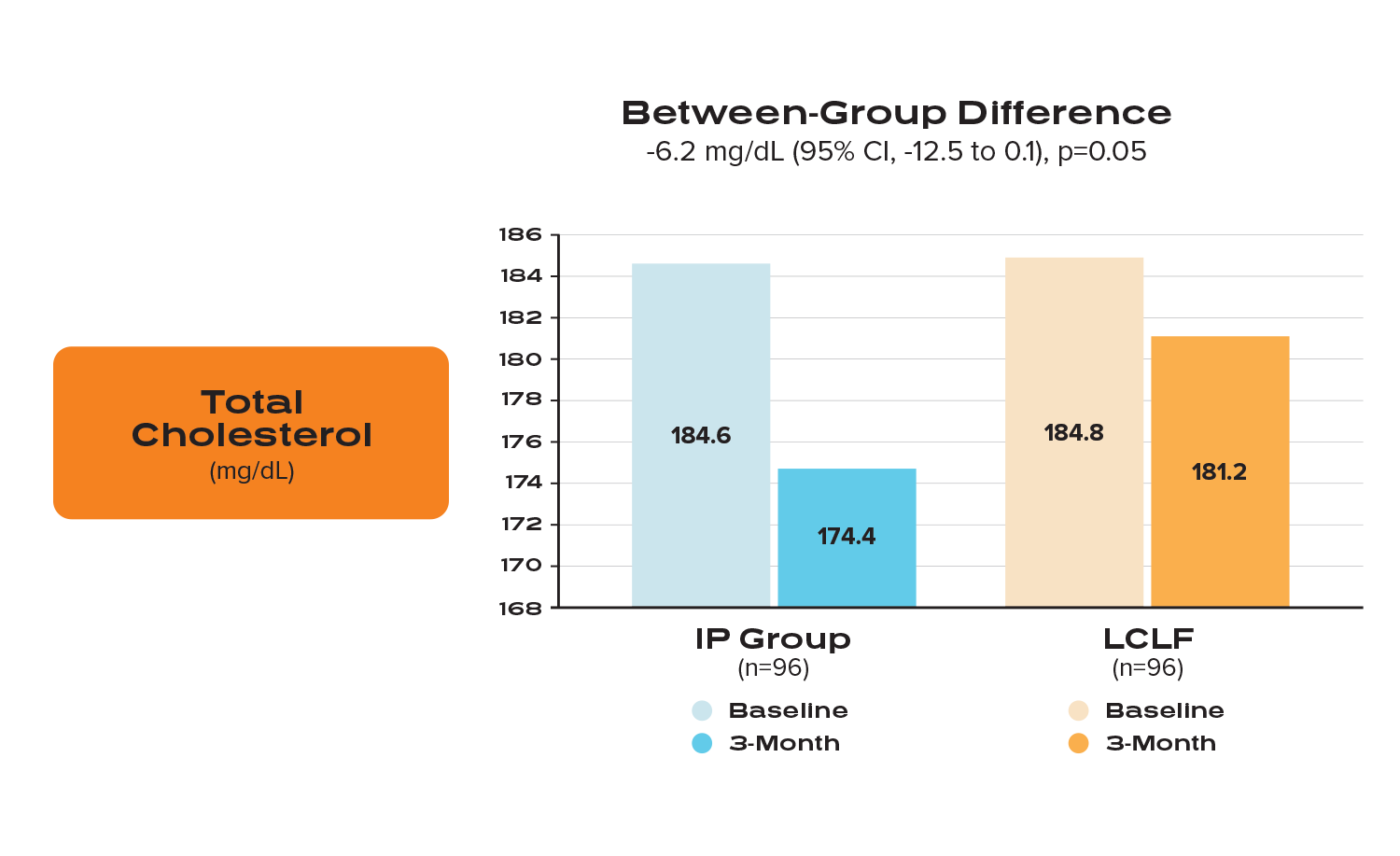
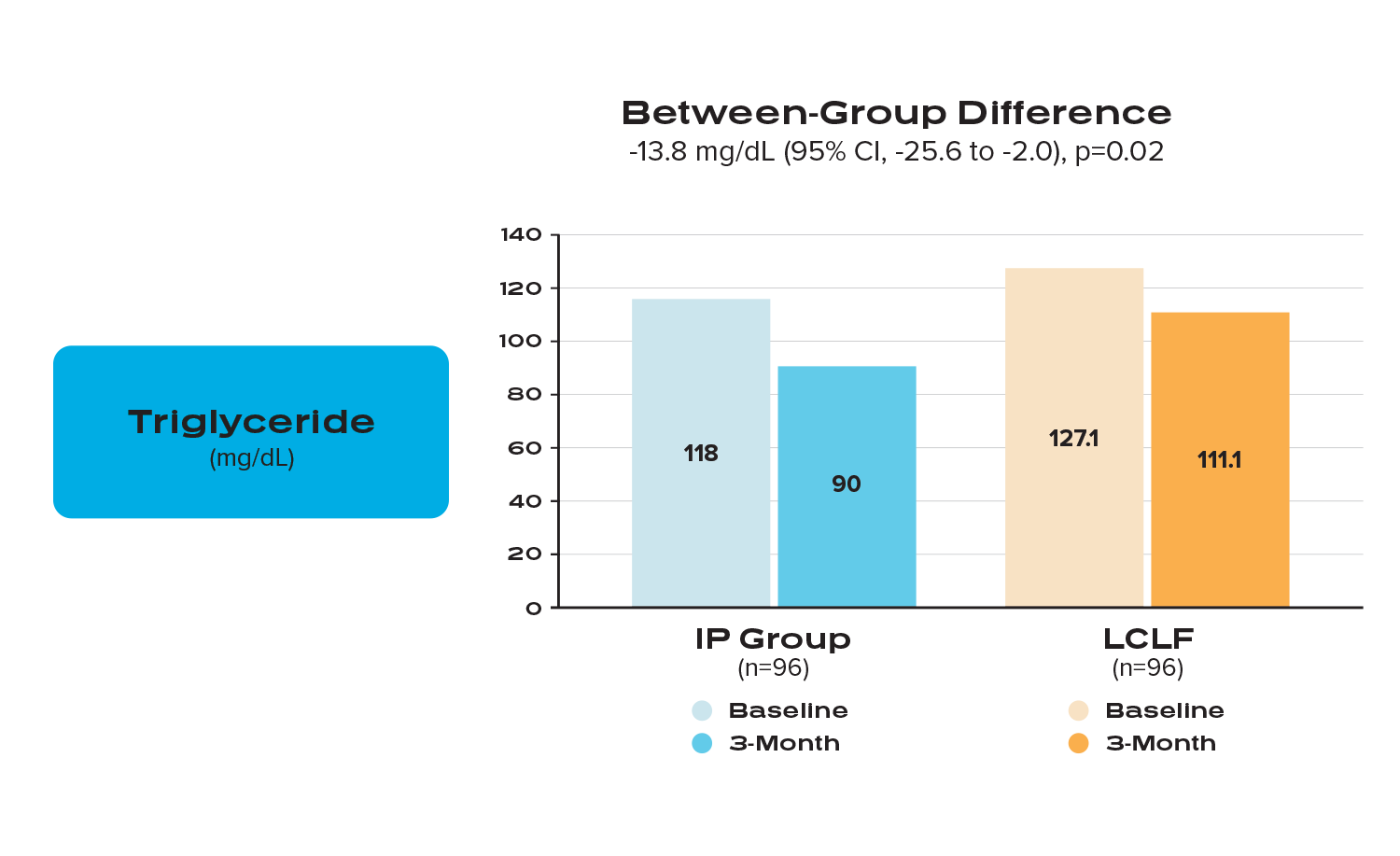
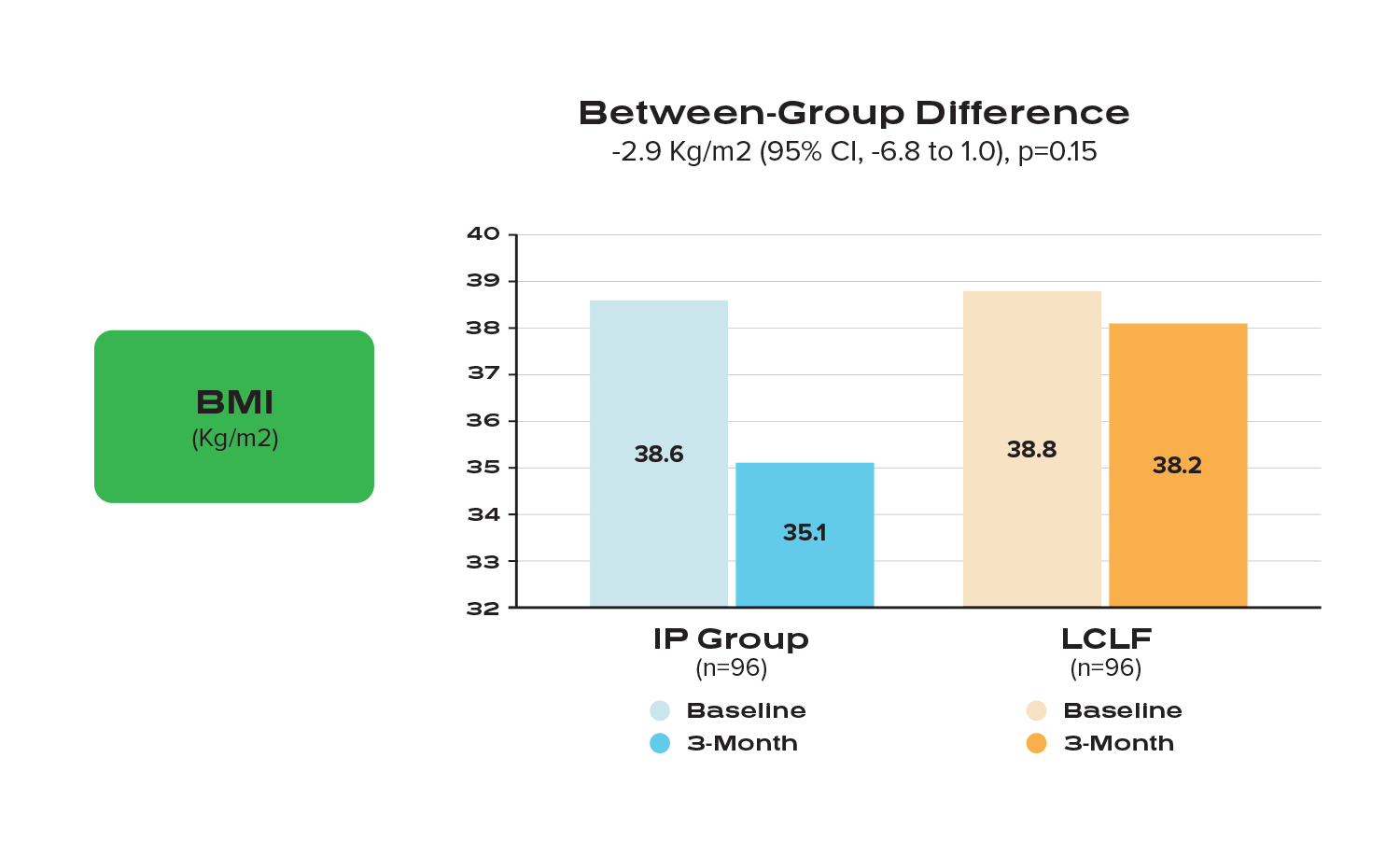
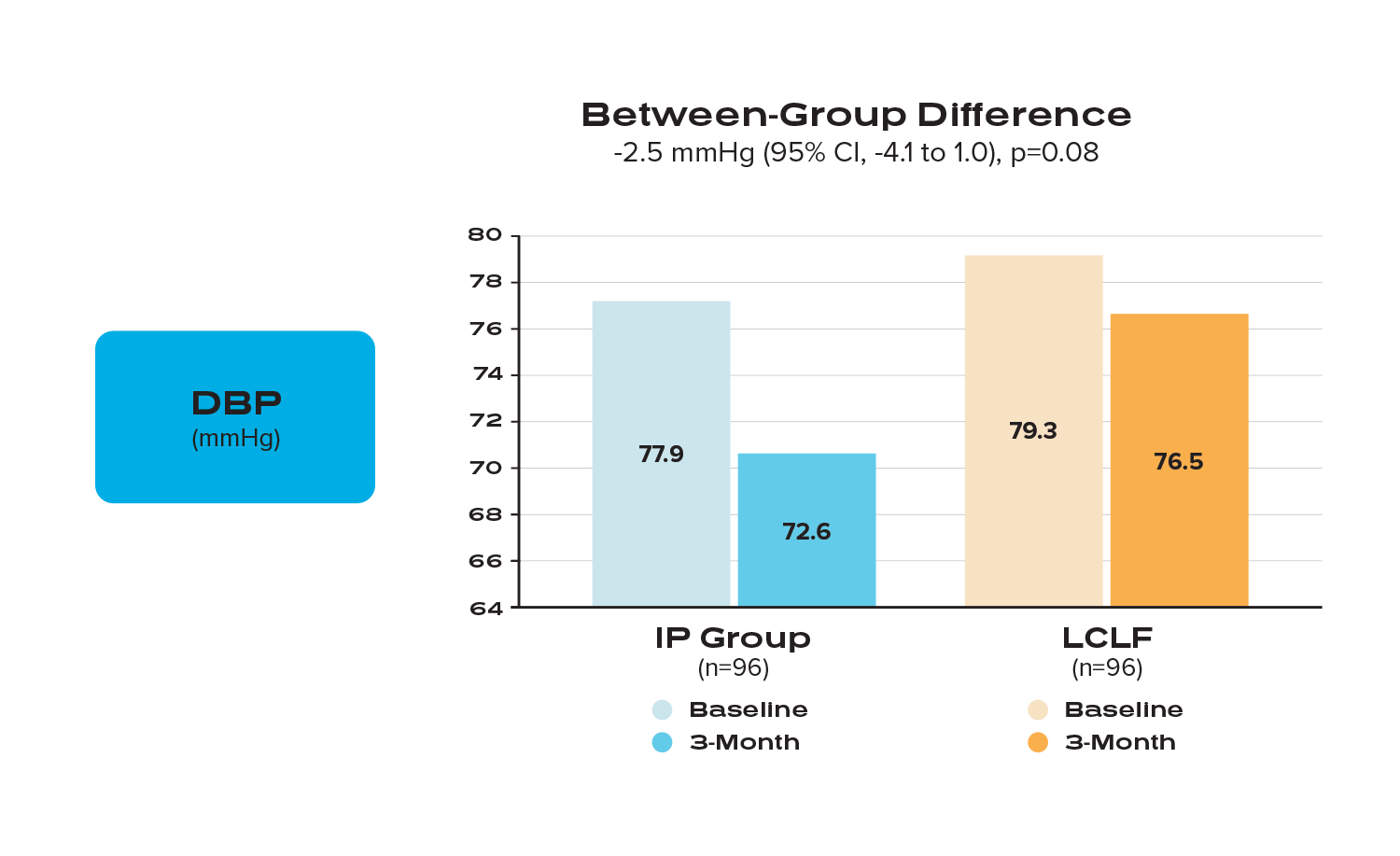
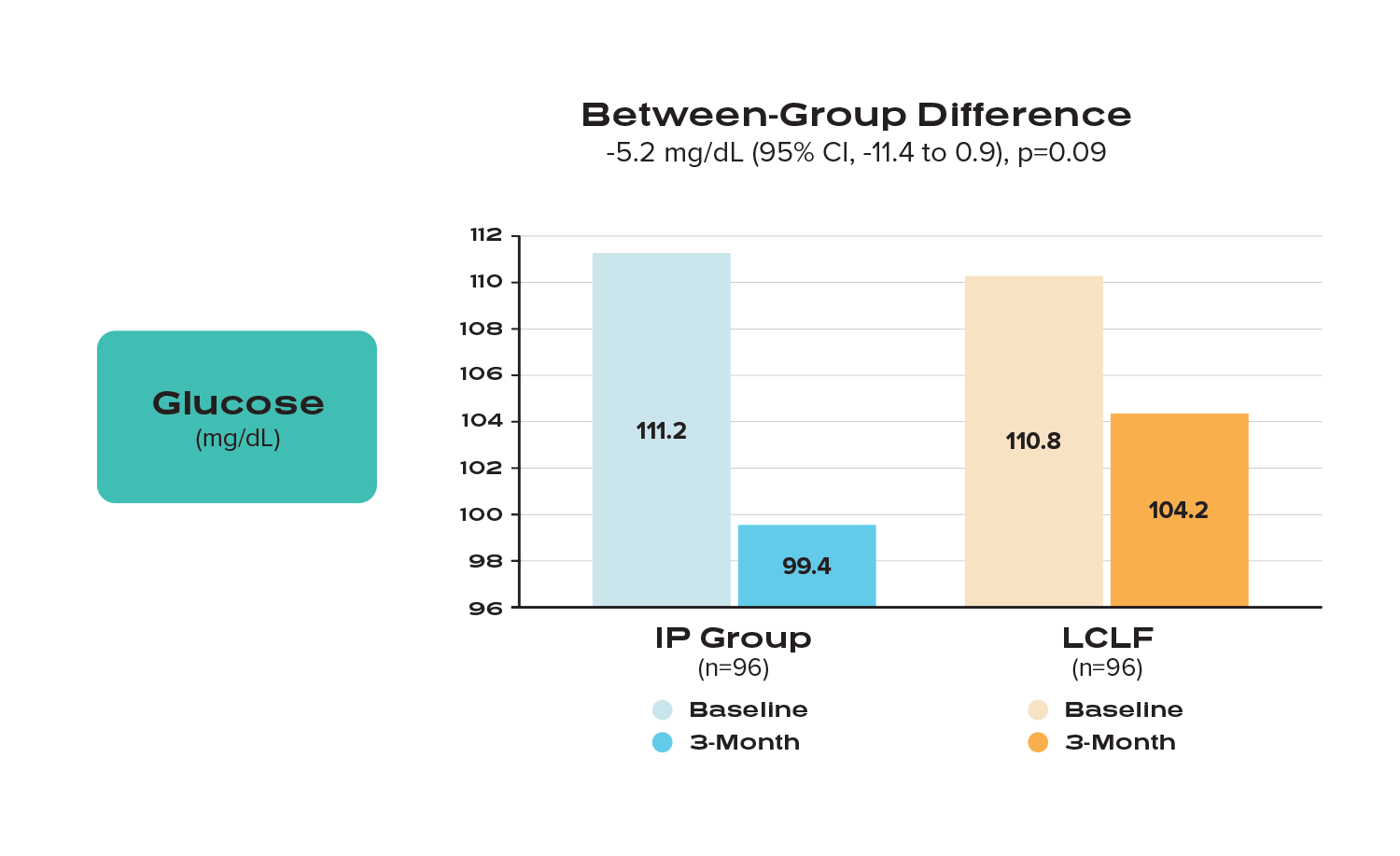
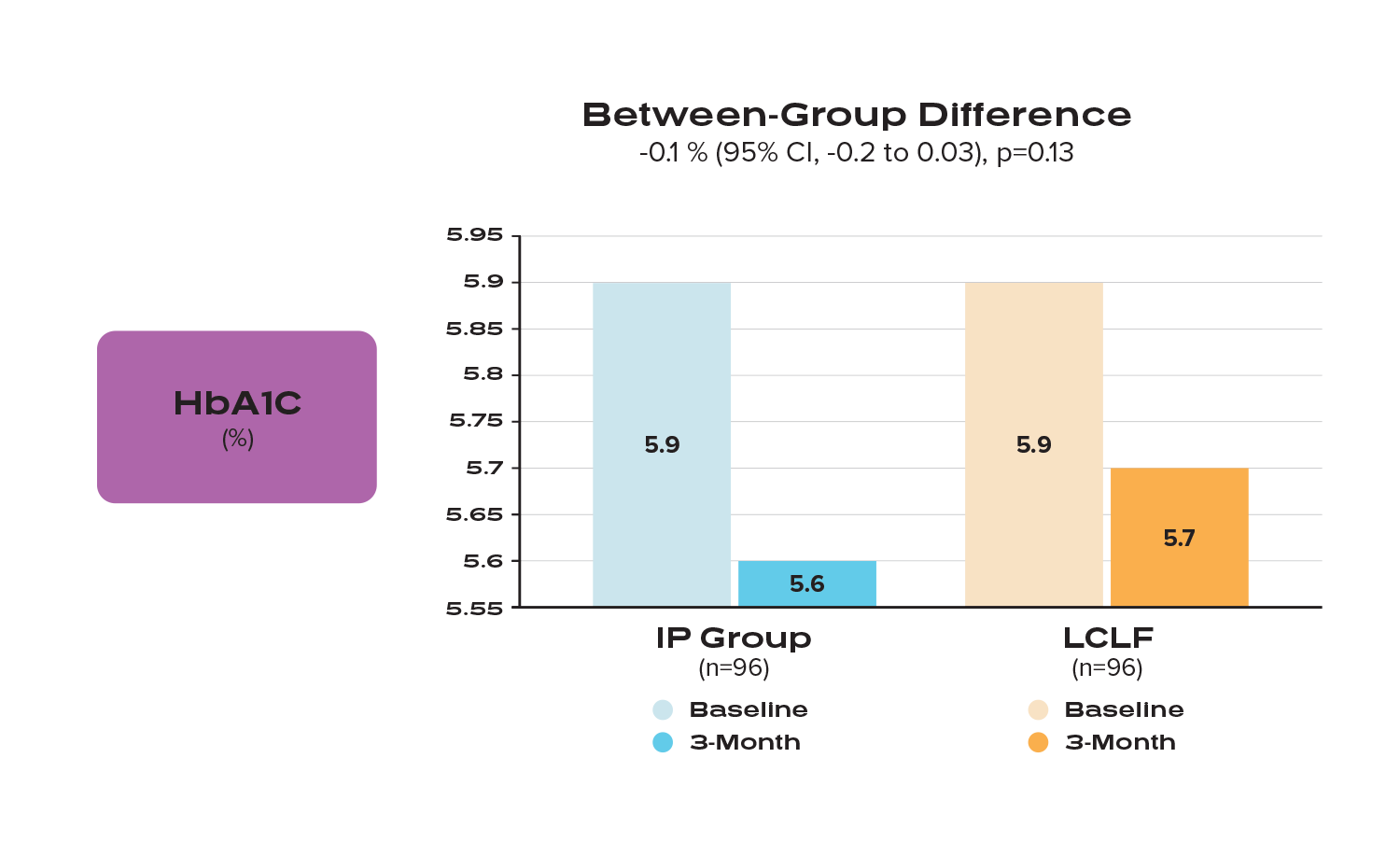
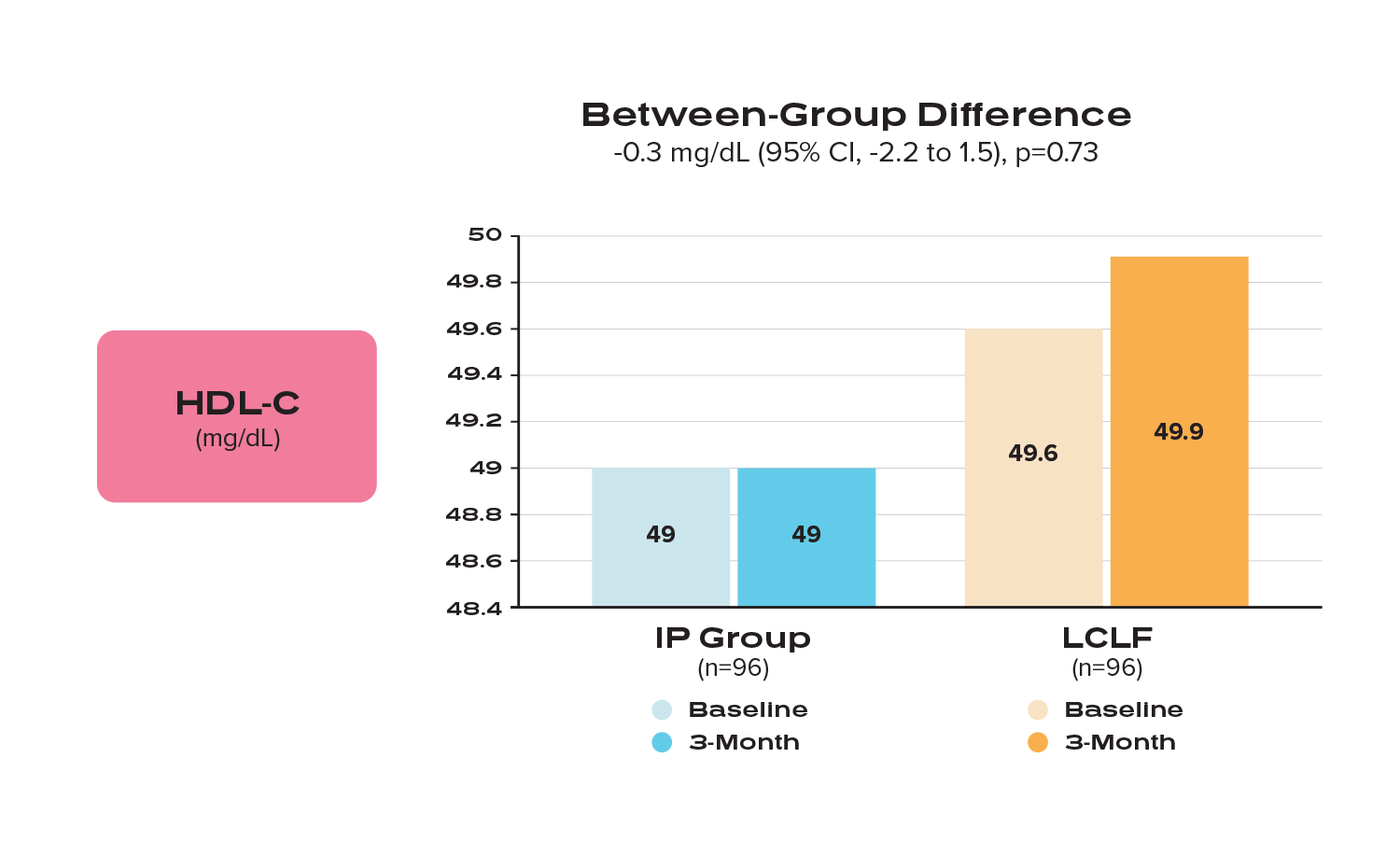
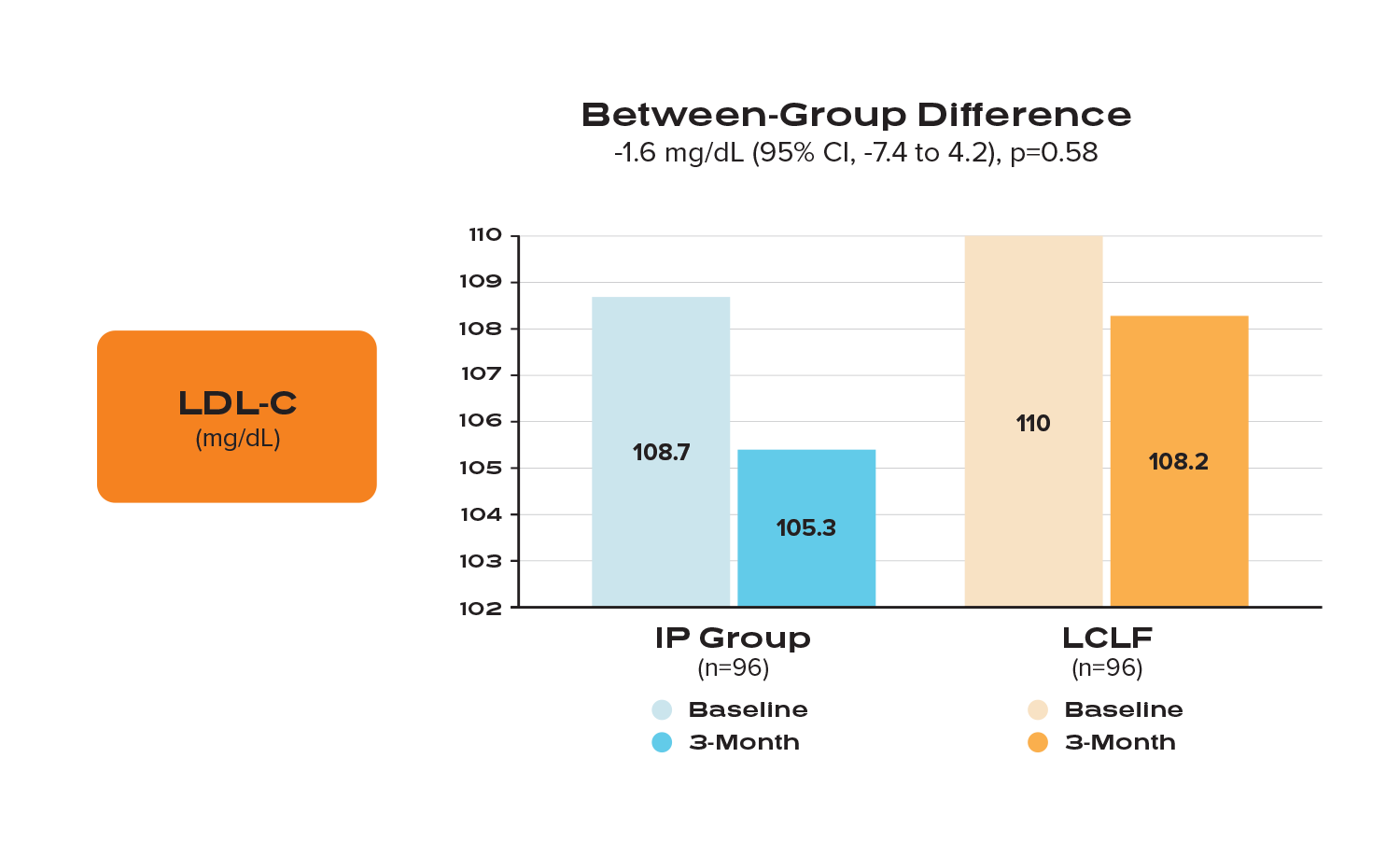
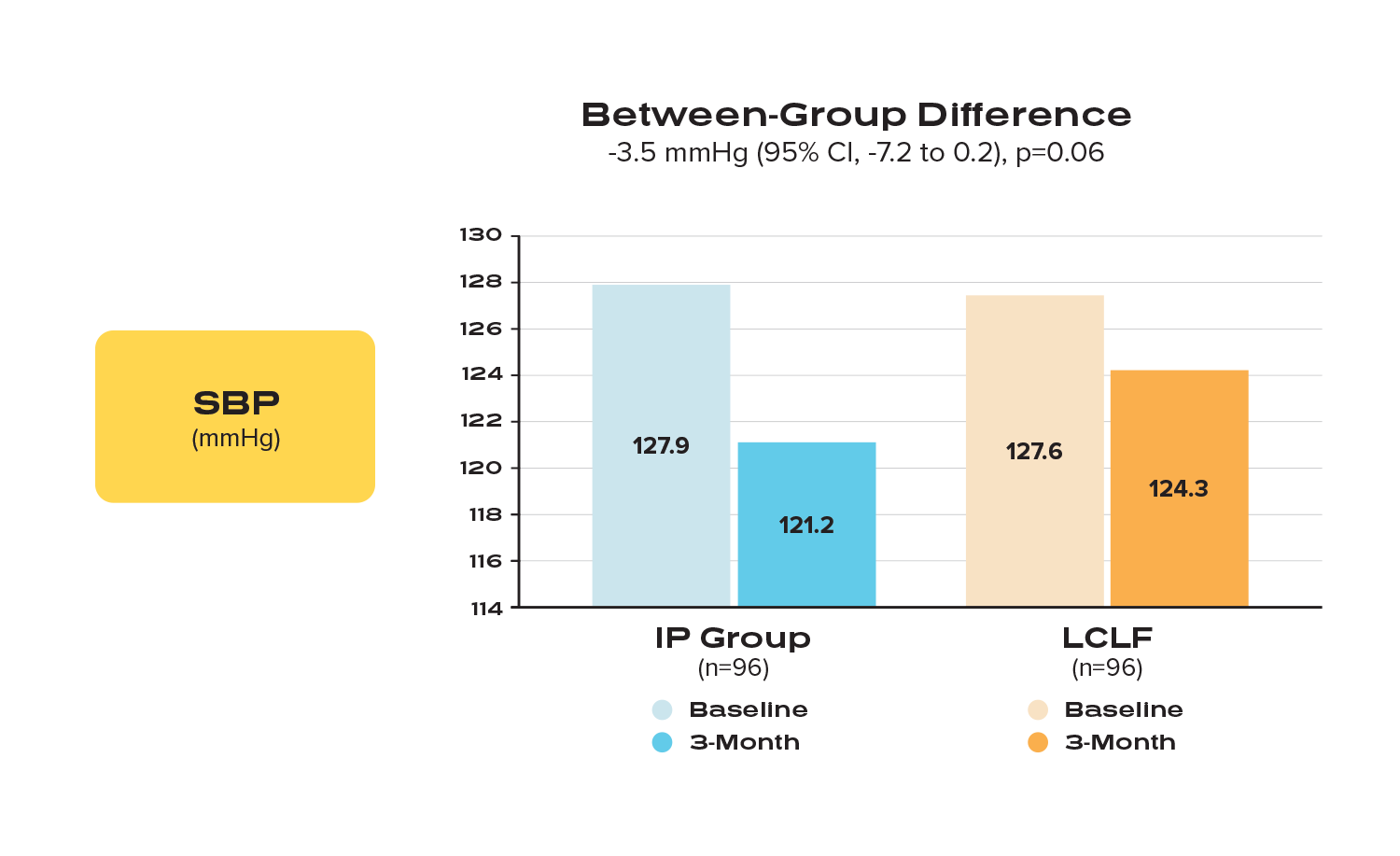
Results of the remaining secondary outcomes for the IP group were equal to or exhibited more favorable trends than the LCLF group, although some did not reach statistical significance in either group.
The study concludes that “this 3-month randomized, parallel group trial showed that the IP system resulted in greater weight loss and reduction in several CVD risk factors than a guideline-based LCLF dietary behavioral intervention among black and white adults with obesity and additional CVD risk factors. Thus, the IP system appears to be a safe and efficacious way to lose weight and reduce CVD risk factors among men and women with obesity and additional CVD risk factors. Further research is warranted to examine outcomes over the longer term.”¹𝄒²
Funding was provided by a grant from Ideal Protein Laboratories COP Inc, Quebec, Canada to Tulane University, School of Public Health and Tropical Medicine.
¹Fernandez CA, Potts K, Bazzano LA. Effect of ideal protein versus low-fat diet for weight loss: a randomized controlled trial. Obes Sci Pract. 2021; 1- 9. doi:10.1002/osp4.567
² Jensen MD, et.al.. 2013 AHA/ACC/TOS guideline for the management of overweight and obesity in adults: a report of the American College of Cardiology/American Heart Association Task Force on Practice Guidelines and The Obesity Society. J Am Coll Cardiol. 2014;63:2985-3023.
“A randomized controlled trial of pharmacist-led therapeutic carbohydrate and energy restriction in type 2 diabetes”
Jonathan P. Little, PhD. Sean McKelvey, Cody Durrer, PhD
A recent randomized, controlled clinical study, led by the University of British Columbia and sponsored by the Institute for Personalized Therapeutic Nutrition, evaluates the impact of a Pharmacist-led therapeutic carbohydrate restricted diet (Pharm-TCR) on type 2 diabetes (T2D). Participants in the Pharm-TCR group were asked to follow the Ideal Protein weight loss diet plan, supplemented with whole foods.¹
The primary objective of the study, published in Nature Communications, was to determine if a Pharm-TCR diet can safely reduce and/or eliminate the use of glucose-lowering medications and lead to improvements in A1C, body composition, cardiometabolic health, and quality of life.² Of the 188 patients that participated in the 12-week study, 98 patients followed a Pharm-TCR diet, and 90 patients received treatment-as-usual.*
Reported Primary Outcomes for Pharm TCR patients after 12 weeks

of patients experienced discontinuation of glucose lowering medication (p < 0.0001)

reduction in A1C (p < 0.0001)
SECONDARY OUTCOMES:
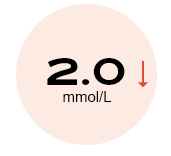
reduction in fasting plasma glucose (p < 0.0001)

reduction in triglycerides (p < 0.0001)

reduction in total body weight* (p < 0.0001)

reduction in waist circumference (p < 0.0001)

reduction in BMI (p < 0.0001)

reduction in body fat percentage (p < 0.0001)
As stated in the 2019 Diabetes Care report, “low-carbohydrate eating patterns, especially very low-carbohydrate (VLC) eating patterns, have been shown to reduce A1C and the need for antihyperglycemic medications.”³
*Treatment-as usual defined as: given information pamphlets on diet and lifestyle conforming with 2013 Diabetes Canada (formerly the Canadian Diabetes Association) Clinical Practice Guidelines.
¹ Durrer, C., McKelvey, S., Singer, J. et al. A randomized controlled trial of pharmacist-led therapeutic carbohydrate and energy restriction in type 2 diabetes. Nat Commun 12, 5367 (2021). https://doi.org/10.1038/s41467-021-25667-4
² Durrer, C., McKelvey, S., Singer, J. et al. Pharmacist-led therapeutic carbohydrate restriction as a treatment strategy for type 2 diabetes: the Pharm-TCR randomized controlled trial protocol. Trials 20, 781 (2019). https://doi.org/10.1186/s13063-019-3873-7
³ Evert AB, Dennison M, Gardner CD, Garvey WT, Lau KHK, MacLeod J, et al. Nutrition therapy for adults with diabetes or prediabetes: a consensus report. Diabetes Care. (2019) 42:731–54. doi: 10.2337/dci19-0014
“Ketogenic, Hypocaloric Diet Improves Nonalcoholic Steatohepatitis”
Yuliya Belopolsky, MD, Claus J. Fimmel, MD, David Davidson, MD
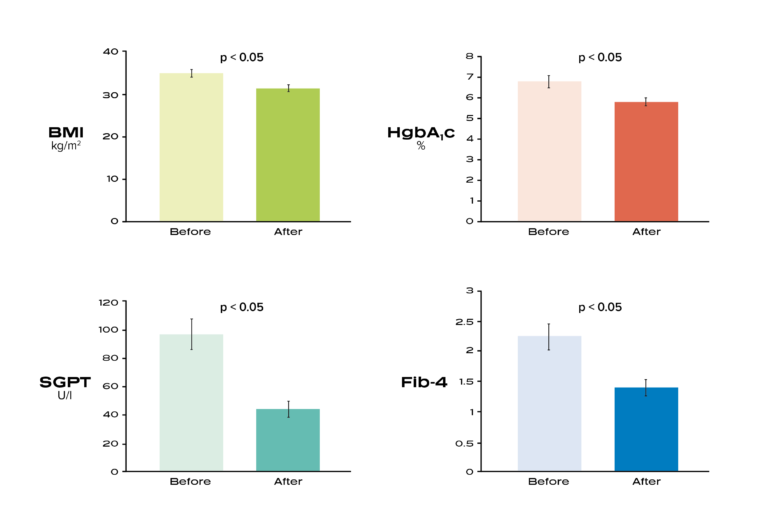
The goal of this study was to examine the impact of the Ideal Protein Protocol on metabolic parameters and markers of liver disease in patients with non-alcoholic steatohepatitis.
The findings highlight the beneficial effects of the Ideal Protein Protocol on liver enzymes and a marker of liver fibrosis among a group of patients with NASH⁸’⁹
Experts estimate that the prevalence of NASH is up to 12%, over 16 million US adults, with estimates of a 63% increase by year 2030. ¹⁰
⁸ Belopolsky Y, Khan MQ, Sonnenberg A, Davidson DJ, Fimmel CJ. Ketogenic, Hypocaloric Diet Improves Nonalcoholic Steatohepatitis. J Transl Int Med. 2020;8(1):26-31. Published 2020 May 9. doi:10.2478/jtim-2020-0005
⁹ Promrat K, Kleiner DE, Niemeier HM, et al. Randomized controlled trial testing the effects of weight loss on nonalcoholic steatohepatitis. Hepatology. 2010;51(1):121-129. doi:10.1002/hep.23276
¹⁰ Estes C, Razavi H, Loomba R, Younossi Z, Sanyal AJ. Modeling the epidemic of nonalcoholic fatty liver disease demonstrates an exponential increase in burden of disease. Hepatology. 2018;67(1):123-133. doi:10.1002/hep.29466
Dr. Davidson is a member of Ideal Protein’s Medical Advisory Board.
Inflammation & Heart Health
Krista N. Bohlen, PharmD, Amy Krie, MD, Yueshan Hu, PhD

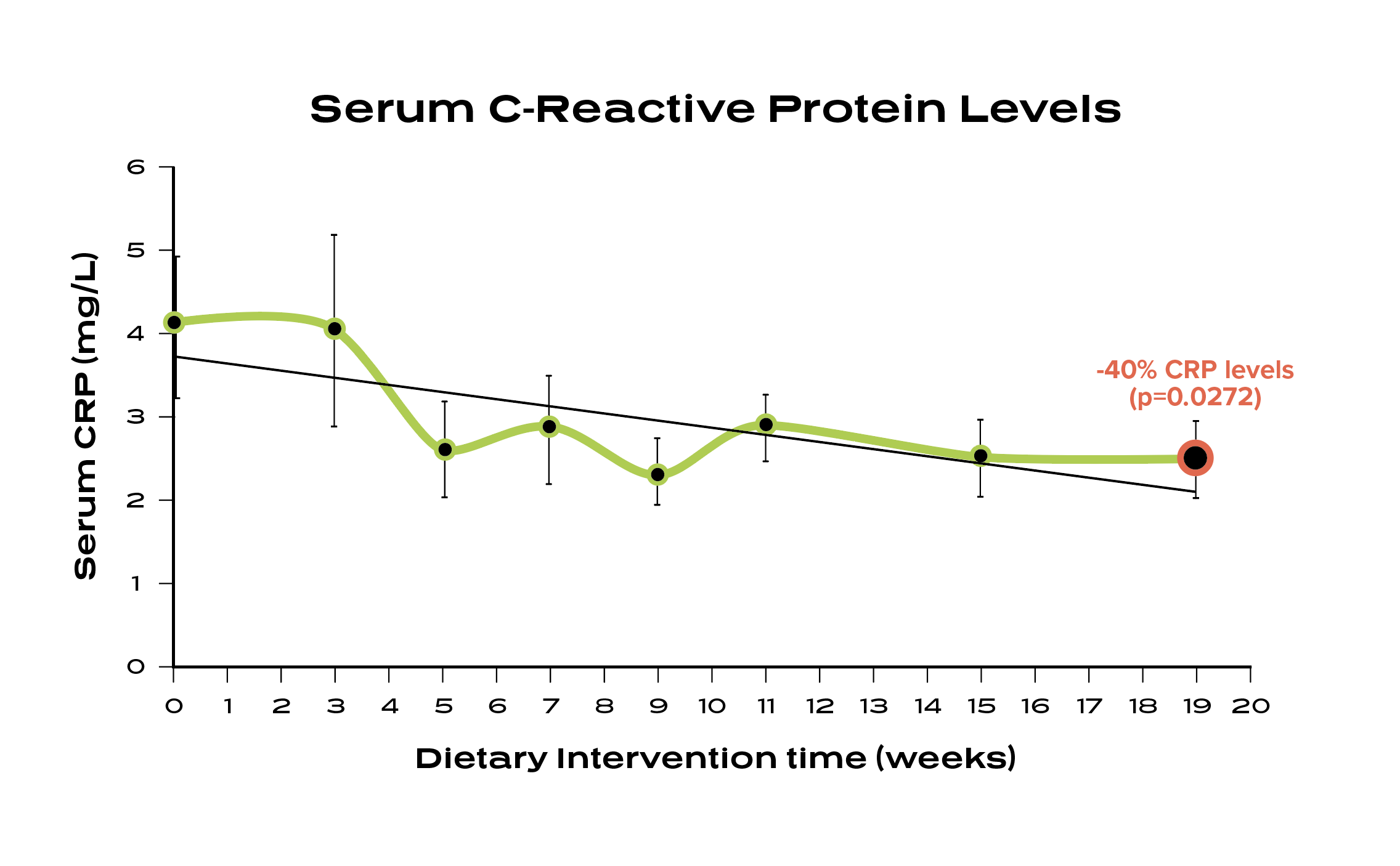
A 19-week study with the Avera Cancer Institute reported a 40% reduction in C-reactive protein for patients who completed the Ideal Protein Protocol. The study also reported a rapid decline in resting fasting insulin and a mean weight loss of 19.9% body fat. ⁶
Studies show increased CRP levels are associated with a higher risk for inflammatory conditions. ⁷
⁶ Bohlen, Krista & Krie, Amy & Hu, Yueshan & Ageton, Cheryl & Nickles, Heidi & Norfolk, Daniel & Kittelsrud, Julie & Thomes, Reggie & Fahrendorf, Adam & Muth, Jessica & Rojas-Espaillat, Luis & Davies, Gareth. (2013). Low Carbohydrate Dietary Intervention Improves Insulin, Hormonal Levels and Inflammatory Markers in Early Stage, Postmenopausal Breast Cancer Survivors. Cancer Research. 73. 10.1158/0008-5472.SABCS13-PD2-5.
⁷ Pepys MB, Hirschfield GM. C-reactive protein: a critical update. J Clin Invest. 2003;112(2):299. doi:10.1172/JCI200318921C
3-year Weight Maintenance & Healthcare Savings
Timothy Logemann, MD, David K. Murdock, MD, MS, Kelly O’Heron, RD, Adam Hoffmann

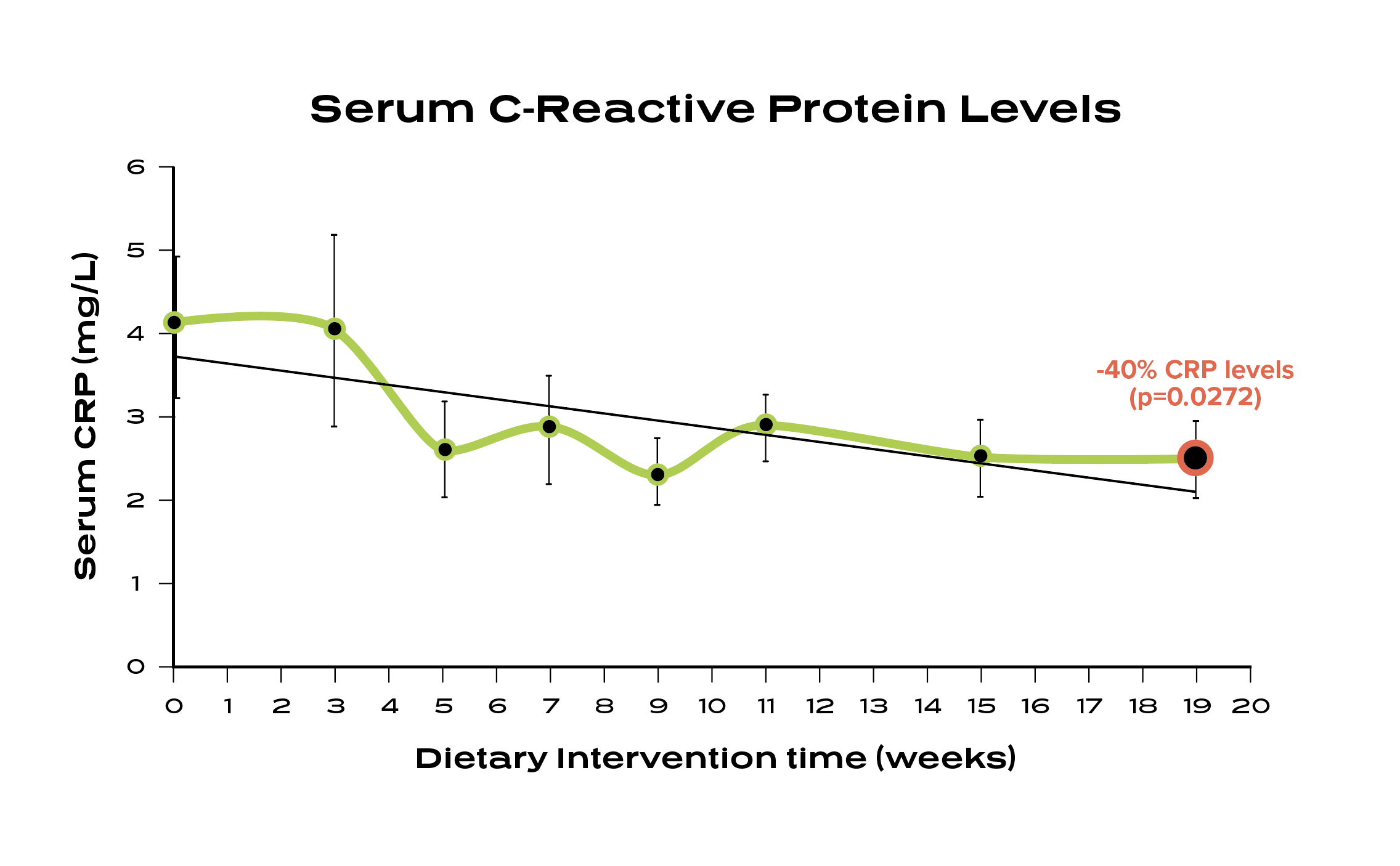
A study conducted by Aspirus, reported that after 3 years, participants who completed the Ideal Protein Protocol maintained an average weight loss of 12.8%, resulting in an 18% reduction in overall average claim care costs, saving an average of $916.97 per participant, per year. ²
A study published by The American Journal of Clinical Nutrition reports that if individuals can succeed at maintaining their weight loss for 2 or more years, they can reduce their risk of subsequent regain by nearly 50%.³
² Effect of The Ideal Protein Weight Loss Protocol on Employee Health Care Costs, By: Timothy Logemann, MD; David K. Murdock, MD; Kelly O’Heron, RD
³ Rena R Wing, Suzanne Phelan, Long-term weight loss maintenance, The American Journal of Clinical Nutrition, Volume 82, Issue 1, July 2005, Pages 222S, 225S, https://doi.org/10.1093/ajcn/82.1.222S
Dr. Logemann is a member of Ideal Protein’s Medical Advisory Board.
“Effect of the Ideal Protein Weight Loss Method on Weight Loss and Metabolic Parameters”
Timothy Logemann, MD, David K. Murdock, MD, MS, Kelly O’Heron, RD
According to a study conducted and published by Aspirus, an eight-hospital health system in Wisconsin and Michigan, entitled Effect of the Ideal Protein Weight Loss Method on Weight Loss and Metabolic Parameters,¹ 233 patients completed at least 12 weeks of the Protocol. The 12-week results were presented at the Cleveland Clinic’s 9th Annual Obesity Summit and at the Annual Scientific Meeting of the National Obesity Society.
Our peer-reviewed, published research demonstrates that, among patients who completed the study, metabolic health can be improved in as little as 12 weeks.
15% ↓
BMI
14% ↓
Total Body Weight*
86% ↓
Dieter Compliance
45% ↓
Triglycerides
14% ↓
Cholesterol
14% ↓
Total Body Weight*
14% ↓
Fasting Glucose
13% ↓
LDL
Study Concludes: The Ideal Protein Protocol produces improvements in blood pressure, lipid profile, particularly in regard to triglyceride levels and fasting glucose levels. The findings suggest that due to the successful weight loss reported, the Protocol could help with cardiovascular risk.
* Total Body Weight -3.5lbs/wk for men and -2.4lbs./wk for women
¹ Effect of the Ideal Protein Weight Loss Method on Weight Loss and Metabolic Parameters By: Timothy Logemann, MD; David K. Murdock, MD, MS; Kelly O’Heron, RD & Adam Hoffmann
Dr. Logemann is a member of Ideal Protein’s Medical Advisory Board.
Robust Weight Loss with Lean Mass Preserved
Franklin M. Douglis, MD
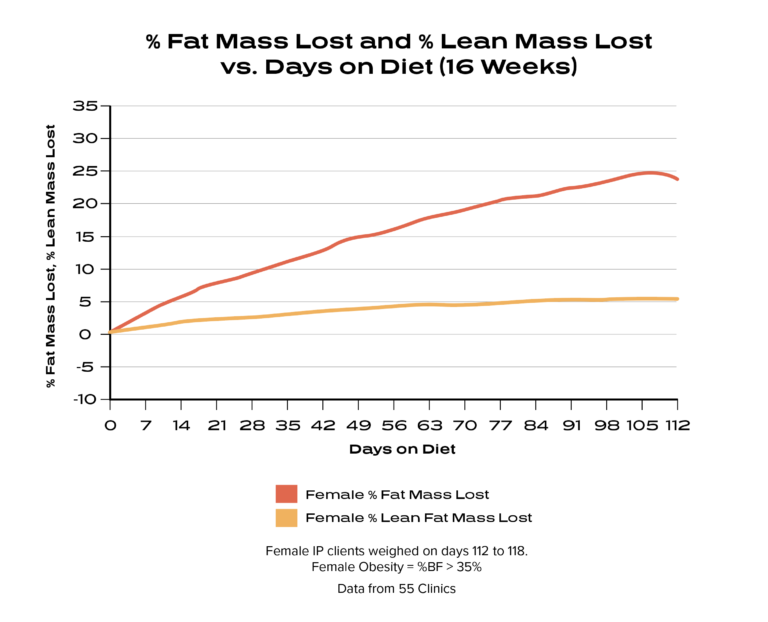
After 16 weeks on the Ideal Protein Protocol, males lost an average of 25% fat mass while preserving 98% lean body mass and females lost an average 24% of fat mass while preserving 95% lean body mass.⁴
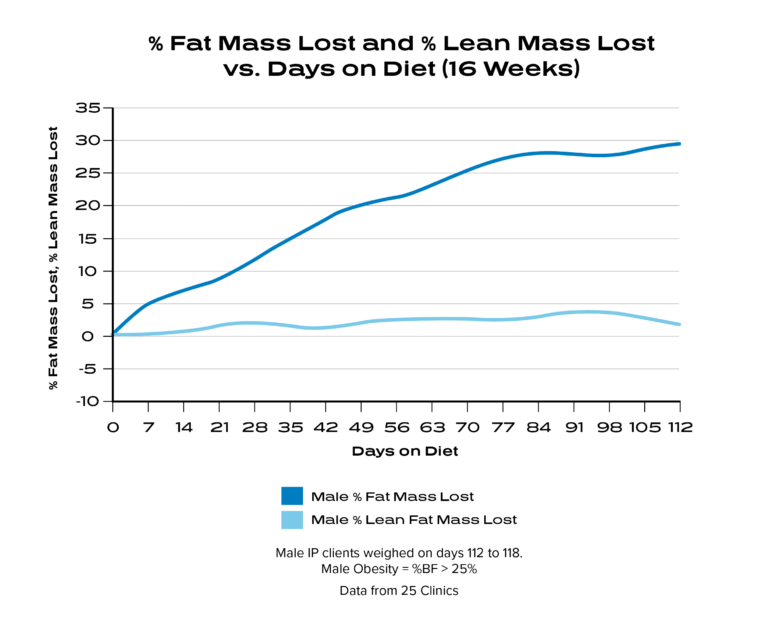
A 2014 Obesity Review states: “Maximizing fat loss while preserving lean tissue mass and function is a central goal of modern obesity treatments. A widely cited rule guiding expected loss of lean tissue as fat-free mass (FFM) states that approximately one-fourth of weight loss will be FFM (i.e. ΔFFM/ΔWeight = ∼0.25), with the remaining three-fourths being fat mass.” 5
⁴ Frank Douglis, MD, Ideal Protein Data Analysis, 2016.
⁵ Heymsfield SB, Gonzalez MC, Shen W, Redman L, Thomas D. Weight loss composition is one-fourth fat-free mass: a critical review and critique of this widely cited rule. Obes Rev. 2014;15(4):310-321. doi:10.1111/obr.12143
Dr. Douglis is an Executive Medical Board Member and Chief Medical Advisor for Ideal Protein.
The Ideal Protein Difference
Proprietary Weight
Loss Protocol
One-On-One
Coaching
Food &
Supplements
Proprietary Weight Loss Protocol
Ideal Protein is a structured three-phase Protocol designed for long-term weight maintenance. The Weight Loss phase is designed to optimize fat loss through nutritional ketosis, a safe and natural metabolic state in which the body’s primary fuel source is coming from ketone bodies – energy molecules produced by “burning fat.”
Throughout the Weight Loss Phase, lean body mass is preserved through the intake of partial meal replacements, which contain protein of high biological value.
One-on-One Coaching
Studies show that to lose and sustain weight loss successfully, there is nothing more important than being assisted by a qualified coach.¹ All coaches are provided ongoing training from Ideal Protein. Through behavior modification and education, our coaches help empower patients with strategies that are critical for long-term healthy weight maintenance.
¹ Sforzo GA, Kaye MP, Todorova I, et al. Compendium of the Health and Wellness Coaching Literature. Am J Lifestyle Med. 2017;12(6):436-447. Published 2017 May 19. doi:10.1177/1559827617708562
Food and Supplements
The Ideal Protein Protocol combines whole foods with medically designed partial meal replacements. Lean body mass is preserved through an adequate daily intake of high biological protein. Essential nutrients are provided through daily supplements, water, and low-glycemic vegetables. Our products are FDA label approved and meet the Recommended Daily Allowance (RDA) standards for all macro food groups and micro nutritional needs.
Stabilization and Maintenance Plans
Following the Weight Loss Phase (Phase 1), the body’s biological response seeks to regain lost energy stores. The Protocol reduces this response through the Stabilization phase by adjusting macronutrient intake in the right proportions to effectively manage hunger, promote greater satiety, and maintain weight loss.
During the 12-month Maintenance phase, patients continue to receive ongoing education, support, and strategies from their coach and clinic to maintain their weight loss and daily navigate an extensive food landscape.
Medical Advisory Board
Ideal Protein’s Medical Advisory Board — comprised of highly regarded medical physicians and industry experts in obesity — provides guidance to healthcare providers who share the same goal of fighting the obesity epidemic through metabolic transformation.
Widely Distributed by Healthcare Providers
Thousands of healthcare providers across North America offer and recommend Ideal Protein to patients, helping them naturally gravitate to a healthy weight and improved metabolic state.
Stabilization and
Maintenance Plans
Medical Advisory
Board
Widely Distributed by
Healthcare Providers
Proprietary Weight Loss Protocol
Proprietary Weight Loss Protocol
Ideal Protein is a structured three-phase Protocol designed for long-term weight maintenance. The Weight Loss phase is designed to optimize fat loss through nutritional ketosis, a safe and natural metabolic state in which the body’s primary fuel source is coming from ketone bodies – energy molecules produced by “burning fat.”
Throughout the Weight Loss Phase, lean body mass is preserved through the intake of partial meal replacements, which contain protein of high biological value.
One-On-One Coaching
One-on-One Coaching
Studies show that to lose and sustain weight loss successfully, there is nothing more important than being assisted by a qualified coach.¹ All coaches are provided ongoing training from Ideal Protein. Through behavior modification and education, our coaches help empower patients with strategies that are critical for long-term healthy weight maintenance.
¹ Sforzo GA, Kaye MP, Todorova I, et al. Compendium of the Health and Wellness Coaching Literature. Am J Lifestyle Med. 2017;12(6):436-447. Published 2017 May 19. doi:10.1177/1559827617708562
Food & Supplements
Food and Supplements
The Ideal Protein Protocol combines whole foods with medically designed partial meal replacements. Lean body mass is preserved through an adequate daily intake of high biological protein. Essential nutrients are provided through daily supplements, water, and low-glycemic vegetables. Our products are FDA label approved and meet the Recommended Daily Allowance (RDA) standards for all macro food groups and micro nutritional needs.
Stabilization and Maintenance Plans
Stabilization and Maintenance Plans
Following the Weight Loss Phase (Phase 1), the body’s biological response seeks to regain lost energy stores. The Protocol reduces this response through the Stabilization phase by adjusting macronutrient intake in the right proportions to effectively manage hunger, promote greater satiety, and maintain weight loss.
During the 12-month Maintenance phase, patients continue to receive ongoing education, support, and strategies from their coach and clinic to maintain their weight loss and daily navigate an extensive food landscape.
Medical Advisory Board
Medical Advisory Board
Ideal Protein’s Medical Advisory Board — comprised of highly regarded medical physicians and industry experts in obesity — provides guidance to healthcare providers who share the same goal of fighting the obesity epidemic through metabolic transformation.
Widely Distributed by Healthcare Providers
Widely Distributed by Healthcare Providers
Thousands of healthcare providers across North America offer and recommend Ideal Protein to patients, helping them naturally gravitate to a healthy weight and improved metabolic state.
